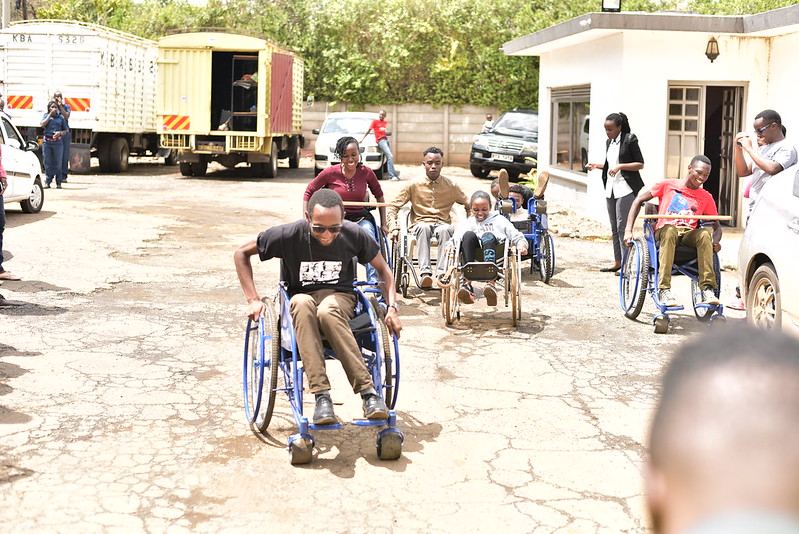After a very successful volunteer training day on Friday 26 April at our offices The 36 people who showed interest to volunteer were taken through all aspects of the Ability programme. This included;
- An introduction to the problems that stem from a lack of basic accessibility features in Nairobi’s buildings and streets
- What universal design is and its importance across all parts of society
- Adopting this concept from the beginning stages of designing any building, street, product, service or technology,
- The actions other cities and countries have taken across the world to create more accessible environments
- What Ability embarked on since May 2018 and the plans to scale up in 2019
- Creating a deeper understanding and sense of empathy through the volunteers simulating disabilities
- Training the volunteers on how to access and use our digital questionnaires
- The mapping schedule set for the week beginning 29th April to 3rd May
- Grouping volunteers into small teams and assigning them their mapping zones per day, As well as their team leaders
- Training on how to take good videos and photos to further illustrate details on their questionnaires as supporting documents
- Code of conduct whilst out mapping buildings and streets
- Using all the information learnt to perform a recce of the digital questionnaires, followed by a session of questions and answers.
Below is a The first of our daily videos that we uploaded on our social media platforms documenting the volunteer training day.
Upon completion, the volunteers and the Ability team met at their start point on Monday 29th April at 8:30 am to begin mapping. With their mapping packs in hand, lunchboxes, topped up smart phones, Assigned team leaders, Ability branded armbands for identification and the tech desk back at our offices ready to receive data, we began by mapping Westlands. This was followed by 7 Government buildings, 7 malls, South B, Seven hospitals and the most recent being 12 churches. Below is a video taking us through day one of our mapping week.
Once the mapping we came to a close on Friday third May, the Ability team alongside the tech desk at the Open Institute began sifting through the data that had been collected, which totalled almost 500 buildings and streets across Nairobi. We also started preparing this data to be populated on our interactive Accessibility Map. Sharing this stage with the volunteers is very important to us for continuity and reporting our progress, so we invited them all back to our offices for a brief breakfast meeting to give them the results of their hard work up to that point.
As the tech desk continues to put together and test the interactive map, Ability is preparing to move on to another stage of mapping which is the hashtag University mapping challenge. Rather than mapping the 20 University campuses we have already identified in the same way, we have decided to make it even more engaging for volunteers (mostly university students) by creating a competition around it. Each campus will have three students as its representatives, these three individuals will make up their campus team, they will be given the rules of the challenge and one week to complete. At the end of the challenge, the Ability team will total up the results and the winners, runners-up and second runners up will be announced on Monday 10th June. The next stage is also making preparations for our policy event. This will be a breakfast meeting at Serena Hotel on Thursday fourth July, from 8 am. Here we will officially launch the ‘Nairobi Accessibility Map’ and publish our findings so far, plus our recommendations. Among our list of invitees, we have high-profile figures such as the Nairobi Governor, The Nairobi Senator, MPs, representatives from our Ministry of transport, education, social protection, as well as DPOs from the disability sector, journalists and so on. After launching our interactive map and raising our concerns surrounding in accessible environments in our city, We hope to have commitments made and action taken towards more inclusive policies and timely implementation. This event will also serve as a preamble to our social media campaign beginning shortly afterwards that sensitises citizens around the importance of accessibility for everyone.
Aside from that, Ability has begun a very exciting and key partnership with an organisation named Signs Media Kenya (SMK) that run a broadcasting station called Signs TV. SMK have offered us free airtime (a 45 weekly slot on Saturday nights for the next six months) to broadcast a show on their station that discusses, educates and advocates for different issues surrounding accessibility in our country for everyone, but especially for people with disabilities. We have settled on simply tightening this show, ability and we will be launching our first episode on our online platforms after its official debut on Signs TV.
Below are photos of the final meeting that took place in regards to this between the Open Institute and SMK.



